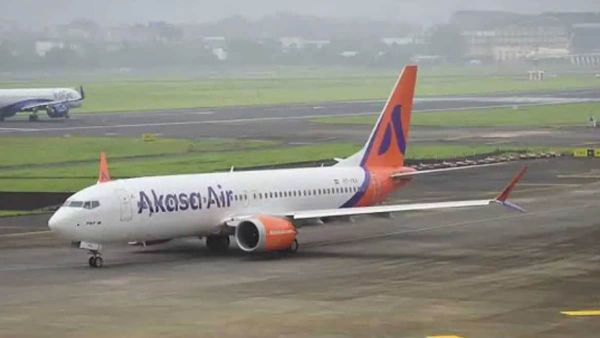
New Delhi: Bullish on growth prospects, Akasa Air is improving its financial performance, expanding capacity and aiming to have 226 planes by the end of 2032, a senior executive said on Tuesday, as he asserted that the nearly three-year-old airline will soon be operationally profitable.
International capacity of Akasa Air is expected to rise to up to 25 per cent this fiscal from the current level of 16 per cent, Akasa Air’s Chief Financial Officer Ankur Goel said, a reflection of the airline’s expansion plans.
Currently operating with a fleet of 30 Boeing 737 MAX aircraft, the carrier also expects to ensure that all its 775 pilots are flying by the end of this fiscal year, ending March 2026.
Goel said that strong revenue gains for the financial year ended March 2025, with revenue rising 49 per cent, supported by increased unit profitability.
“Capacity in terms of Available Seat Kilometres (or ASKs) grew at a staggering rate of 48 per cent compared to FY25. This was driven by a 13 per cent increase in stage-adjusted Revenue per Available Seat Kilometre (RASK), supported by enhanced focus across key business functions, including strengthened distribution capabilities and strategic investments in technology.
“The airline’s Unit Cost per Available Seat Kilometre (CASK), excluding fuel, reduced by 7 per cent and EBITDAR margins for the year improved by 50 per cent despite industry-wide inflationary pressures,” he said.
EBITDAR refers to earnings before interest, taxes, depreciation, amortisation and rent costs.
In FY26, he said the airline expects its capacity to grow over 30 per cent in terms of ASKs.
The loss-making airline expects to be operationally profitable soon.
“If we are myopic (with) profitability, then we will have to take a lot of short-term decisions,” Goel said.
Revenues from ancillary services, which account for 10 per cent of the total revenues, are a key element for Akasa Air, which currently offers more than 25 ancillary products.
According to him, Boeing has been a very supportive and reliable partner, and the airline is getting planes sooner.
The airline has placed firm orders for 226 Boeing 737 MAX planes, and 30 have been delivered so far, with Goel saying deliveries are expected to pick up in the coming years.
The executive said the carrier aims to have 226 planes by the end of 2032, and the fleet capacity growth will be around 25-30 per cent CAGR (Compound Annual Growth Rate) in the seven-year period.
At present, Akasa Air has 23 Boeing 737-8 planes that have up to 189 seats and 7 Boeing 737-8200 aircraft that have up to 197 seats. Boeing 737-10 planes that will have up to 227 seats are expected to join the fleet from 2027, Goel said.
On whether there has been an impact on overall demand post the Air India plane crash, Goel said he has not seen any impact on demand.
While emphasising that the airline focuses on cost efficiency and cost leadership, he highlighted that in the Indian aviation market, capacity is growing at around 8 per cent, while the demand is rising by 15-18 per cent. “This is the golden decade of Indian airlines.”